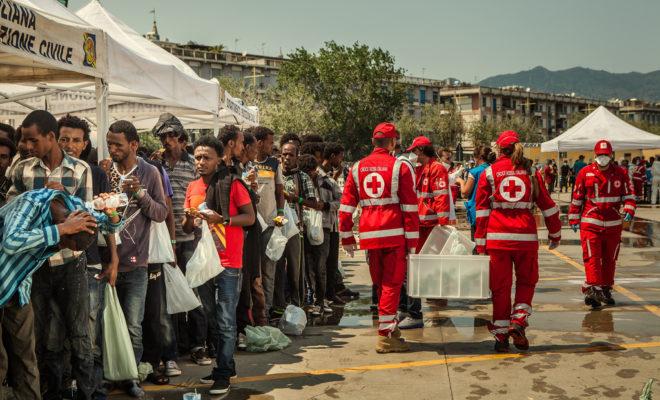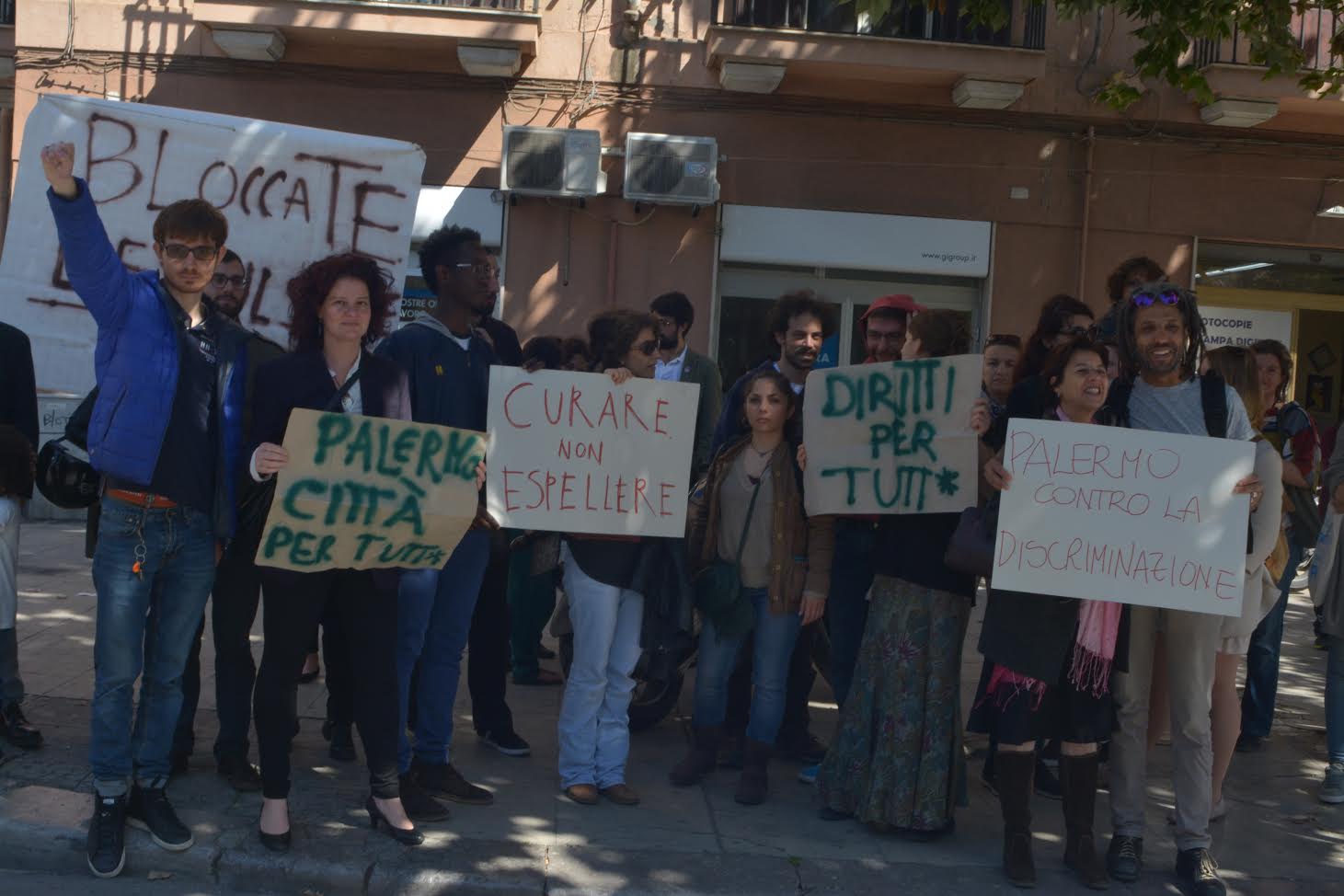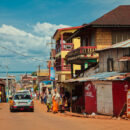Italy’s deportation drive hits new low with mentally-ill African migrant

The forced expulsion of a Moroccan student who’s been in Italy for nine years and suffers from mental health problems sets a scary precedent.

A rally in support of S held on 18 April outside of the Prefecture in Palermo. The middle sign that reads Curare non espellere translates as “heal, don’t deport”. Credit: Rabih Bouallegue.
On 9 April, a scholarship student at the the University of Palermo, in Sicily, Italy, walked into the school cafeteria and purportedly yelled: “Whoever is a Satanist and wants to die, remain here. Those who are Christians, Muslims, Jews, get out.”
The incident caused panic amongst diners who fled the building. The unarmed student, who is being referred to publicly by his initial S, was questioned by the police, who gave him a verbal warning and quickly left after they deemed that he posed no threat.
S, who moved to Palermo from Morocco in 2008 to join his family, has a history of well-documented mental illness and was under medical care. Nevertheless, when he went to hospital for treatment four days later in an agitated state, the hospital called the police who apprehended him. He was taken to the police station where a deportation order was issued, and then to an immigrant detention centre to await his expulsion. The unarmed schizophrenic young man was deemed a “danger to society”.
Volunteer, friend, resident
The right to healthcare for all people residing in Italy is guaranteed by the constitution. The fact that a person suffering from mental health problems is set to be deported as a direct result of his illness sets a dangerous precedent. His removal would indicate that any foreign-born resident, even those with legal permits of stay, can be sent away if deemed to be a “danger to society”. Even on highly questionable evidence and when those people are gravely ill.
“What our Constitution and international conventions say is that health should be safeguarded,” said Ilenia Grottadaurea, S’s lawyer. “S. is a young man who is perfectly integrated into Palermo, and is active in voluntary associations. He is not at all a danger to society.”
Members of the Italian Senate have launched a parliamentary inquiry into S’s case, asking legislators if they “no longer find the support of a health care facility more appropriate than an expulsion order”. The result of this inquiry may reveal how a mentally ill young man was criminalised instead of offered the care he needs.
The pro-immigrant Mayor of Palermo, Leoluca Orlando, has also voiced his support for S and raised concerns about the legal basis of his deportation. “We are faced with measures of questionable constitutionality, and for this reason the City will undertake any initiative to guarantee assistance to our fellow citizen”, he said. National unions, non-profits, associations, and immigrant service providers have expressed support for the student as well.
Nevertheless, S’s deportation was affirmed yesterday, when a judge rejected the appeal filed by his lawyer, stating that S’s removal from Italy would not cause “irreparable harm” to his health.
Daniele La Barbera, the Director of the School of Psychiatry at the University of Palermo, disagrees. “Deporting someone who really should be in care is a racist and shady act of unspeakable violence,” she said in a press release. “It is never acceptable to replace therapy with punishment. The consequences can be extremely serious, precisely because the patient is so fragile.”
S’s friends echo this, emphasising that deporting him to Morocco would mean removing him from his community in Palermo to a place where he has no support network, and where his treatment will be interrupted.
In a statement released this morning they called S, who has lived in Sicily for nine years, a “volunteer, friend and student of our city” who, “notwithstanding his problems, has represented an example of generosity, warmth and civic duty”. They have begun an advocacy campaign called S Libero and will continue to push for him to be offered a permit of stay for ongoing medical care. But legally now, he could be deported at any time.
Forced deportations
Italy has been at the front line of migrants arriving from Africa for the last few years. In 2016, over 180,000 people arrived on its shores, the majority originating from countries such as Nigeria, Eritrea, Guinea, Cote d’Ivoire, the Gambia, Senegal, Mali and Sudan.
[Review: Migrant, Refugee, Smuggler, Saviour – by Peter Tinti and Tuesday Reitano]
[Between a rock and a hard place: Gambians tackle Fortress Europe]
The official response to mass immigration over this time has become increasingly hard-line. This has especially been the case since Prime Minister Paolo Gentiloni came into office late last year, replacing Matteo Renzi.
For example, in contrast to Operation Mare Nostrum, which provided support for humanitarian rescue efforts at sea until it was ended in 2014, the current government is attempting to criminalise NGOs who operate in the rescue area. They allege that they are colluding with smugglers and human traffickers to bring migrants to Europe.
A few days after the 19 December 2017 attack in Berlin in which a Tunisian national killed 12 people when he drove a truck into a crowd, the police and interior ministry sent a directive to police departments calling for patrols to trace foreigners and expel irregular immigrants. It cited “growing migratory pressure and an international scenario characterised by instability and threats”.
Furthermore, the new government has significantly stepped up forced deportations. By mid-April, 6,242 migrants had been expelled this year, according to the Interior Minister Marco Minniti. This is a 24% increase from the same period last year. Italy currently has bilateral repatriation agreements with Egypt, Tunisia and Nigeria and has indicated that it is seeking to develop similar agreements with other African countries.
Aside from forced deportations, which often break up families and uproot vulnerable and long-standing residents like S, Italy faces deep challenges regarding the integration of migrants and the renegotiation of Italian identity. Integration is more than a word. It is an active practice that calls societies to continually struggle to include all of their members, particularly the most vulnerable.
There is a saying in Italian: Fra il dire e il fare, c’é il mare. “Between the saying and the doing lies the sea”.
Tragically, S, a student with serious mental health problems, has been cast out into that sea between the constitutionally-enshrined right to healthcare and the anti-immigrant fervour taking over Italian politics.






